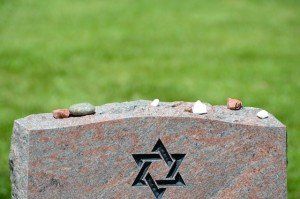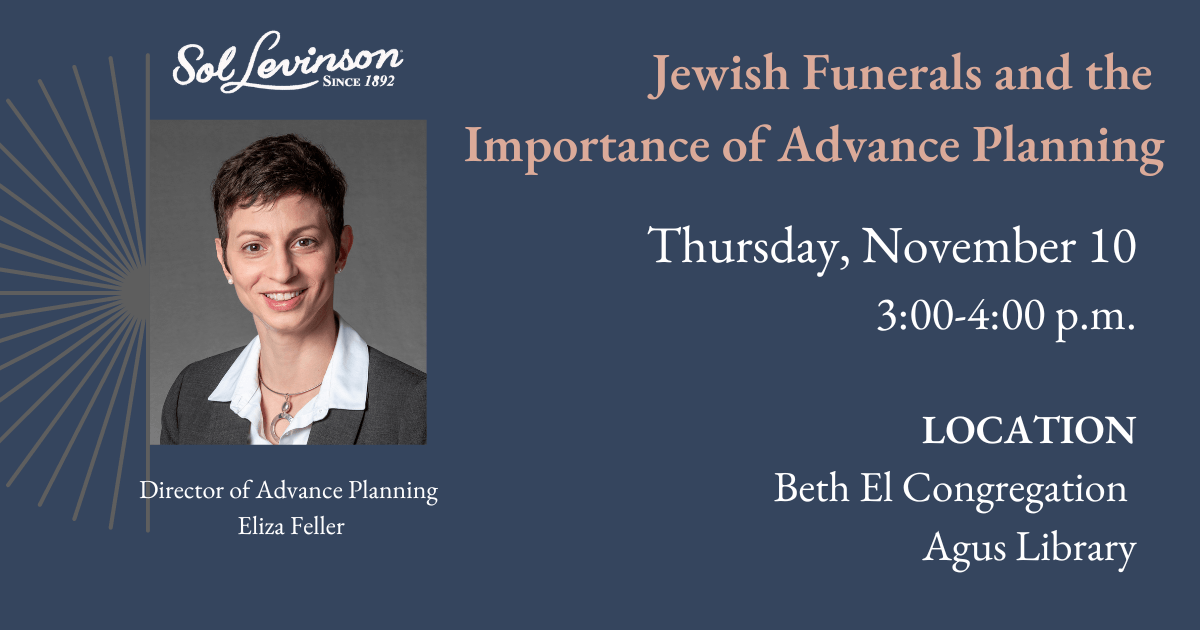


As Jews, we believe it is our duty to accompany the deceased to the cemetery for burial, as the Hebrew word for funeral is “levaya,” which literally means “escorting.” Burying the dead is one of the biggest mitzvahs that we can complete, because we know that there is no way for that person to ever repay us for this act. But have you ever wondered why we sometimes make several brief stops while carrying the casket from the hearse to the grave?
We’ve reached out to a couple of local Rabbis to ask what their take on this tradition is. Rabbi Chai Posner, of Beth Tfiloh Congregation, believes that – much like using the back of the shovel to place earth in the grave – it shows reluctance. Rabbi Posner is quoted saying, “It shows that we are hesitant. It is a balance between a mitzvah and hesitation that we don’t want to be burying them. It makes what we are doing very intentional – just like using the back of the shovel.” We also reached out to Rabbi Susan Grossman of Beth Shalom Congregation in Columbia, who had a another approach to this sacred act. Rabbi Grossman says, “We stop seven times, one for each day of the week, to represent creation. We honor the deceased by stopping seven times because each individual represents the full potential of creation.”
Both of these explanations provide a deep insight to the Jewish views of death and burial, meant to give mourners some comfort during a very difficult time. Of course, like anything else in Judaism, we have heard several other explanations throughout the years, and we always recommend that you reach out to your own rabbi to see what their beliefs are.
When someone we know loses a loved one it is our instinct to comfort them, whether that is with words, food, or a hug. Often times, we find ourselves at a loss for what to say, or accidentally saying the wrong thing, even though our intentions are well-meaning. There are several do’s and don’ts when it comes to comforting mourners and, specifically, attending a shiva house. Read on for more information on what is appropriate and helpful during someone’s mourning period.
Beginning with the universal comfort, food is always welcome at a shiva house. The last thing anyone who is grieving should have to concern themselves with is cooking (for themselves or their guests). You should be sure to find out in advance if it is a Kosher home so as not to send anything that can’t be eaten. Any food should also be easy to serve and not have to be prepared (things like deli trays, bagels, and dessert trays are always good options). You might also consider sending them a credit or gift card to a restaurant or deli that they can use at a later date, since they may be inundated with food trays in the early days.
If you are looking for things to do to help, any cleaning up or regular household chores will always go a long way in making things easier for the family. Doing dishes or cleaning the kitchen is the most obvious. Taking the trash and recycling out is another chore that sometimes gets ignored until the end of the evening once it is overflowing. Depending on how close you are with the family, you could even consider something like cutting the grass if it needs it in the morning before anyone arrives. Of course you don’t want want to overstep but, based on your relationship, you can determine how involved you should get. If you are tasked with helping to set up or organize the shiva house, check out our page with tips to setting up a shiva house. Try to anticipate their needs instead of asking “What can I do to help”, because they probably do not know what they need.
Try to avoid saying things like, “I know how you feel,” “When my mother died…,” or “At least they didn’t suffer.” The truth is you really do not know how they feel, or if they suffered, even if you also lost your mother recently to the same illness. Mourning is an extremely personal experience and no one knows what someone else goes through when they lose someone. Instead, tell them how sorry you are for their loss, be there to listen or sit quietly with them. If you are struggling with what to say, it is important to share memories of the deceased, or times the mourner told you a story about that person. You should also avoid cliches like, “He is in a better place,” “She lived a long life,” or “Time heals all wounds.” In the mind of a mourner, there is no better place for their loved one to be than with them and, even if their mother was 98, no life is long enough. There is also no time limit on someone’s grief. According to Carla Sofka, Professor of Social Work at Siena College, “We grieve, five or ten minutes a time, for the rest of our lives.” ( womensrabbinicnetwork.wordpress.com ).
Sometimes, the best thing you can do for a mourner is just quietly and be there with them. Let them do the talking if they feel like it. Hug them, tell them how sorry you are, and continue to be there when shiva is over. It is important to remember that once everyone else has gone back to their normal lives, they are left to navigate a new life without their loved one. Remember to extend an arm and offer comfort once life has moved on for everyone else.




*Restricted - operating out of Sol Levinson & Bros., Inc.